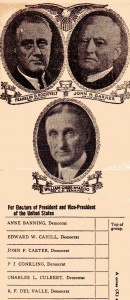Several years back I came across a 1932 letter on the stationery of the Democratic State Central Committee’s Roosevelt-Garner-McAdoo campaign headquarters in Los Angeles that included photographs of Franklin Roosevelt, John Garner, William McAdoo and the names of the state’s 22 presidential electors.
Sixth on the electorate list was R. F. Del Valle. I recognized the surname, but was uncertain as to the family’s role in modern politics.
R. F. — also known as Reginaldo Del Valle — and his father, Ignacio Del Valle, was closely associated with civic life in early California.
“From the last years of Mexican rule through the first 74 years of California statehood — 1839 to 1924 — the Del Valles were among the most prominent families in Southern California,” Cecilia Rasmussen had written in the Los Angeles Times.
They were Californios, with roots in the Spanish and Mexican periods. And they had demonstrated leadership before and after statehood in 1850.
Ignacio Del Valle was one of the first mayors of Los Angeles. In 1882, Reginaldo, a young attorney, won election as president pro tem of the state Senate, Twenty-five years later, after the start of the Mexican Revolution in 1910, he served as a U.S. commissioner to Mexico and then as a Roosevelt elector in 1932.
This was the evidence I had sought — that early Hispanic influence in California extended into the New Deal period, at which time Mexican Americans, many of whom had escaped the revolutionary violence, were becoming part of the Roosevelt New Deal Democratic Party.
After spending some time at the Franklin D. Roosevelt Presidential Library and Museum in Hyde Park, N.Y., I discovered that Reginald’s daughter, Lucretia, had continued the tradition.
Lucretia Del Valle Grady was a fascinating individual. She was a stage actress who in 1917 married Henry Gradley, dean of U. C. Berkeley’s College of Commerce from 1928 to 1937 and as a U.S ambassador under President Harry Truman.
She served on the Democratic National Committee as the committeewoman from California, an important post, given that the large state had only one male and one female representative on the national body. As the committeewoman, in 1936 she was honorary vice chair of the National Roosevelt-Garner Campaign Committee in California. She worked with supportive elected officials and businesses.
Lucretia Del Valle Grady likewise provided assistance to the most prominent Latino elected official of the late 1940s and early 1950s: Edward Roybal. When in 1954 Roybal ran as the Democratic candidate for lieutenant governor —an office that eluded her father in 1890 — Del Valle Grady headed the state women’s committee for Roybal.
Roybal lost the race but was elected to Congress in 1962. He was the first Hispanic from the state in that body in many years.
Interestingly, Roybal and the Del Valles shared roots in the Spanish period; Roybal’s ancestors settled in Santa Fe, N.M. Both families were residents of Mexico before the Southwest became part of the United States.
Roybal is well remembered. Lucretia Del Valle Grady deserves to be remembered, too, as a pioneering Latina in state and national politics, as does her father, a state senator, and grandfather, a Los Angeles mayor some 150 years before Antonio Villaraigosa.
* * *
This column was distributed by the Hispanic Link News Service in English and Spanish.


